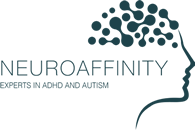When it comes to managing ADHD (Attention Deficit Hyperactivity Disorder) and ASD (Autism Spectrum Disorder), there is no one-size-fits-all solution. Treatment plans must be tailored to the individual, focusing on their unique strengths and challenges. At Neuroaffinity, we specialize in evidence-based, holistic approaches to support individuals in leading fulfilling lives. Here, we explore various treatment options and how they can make a difference.
- Medication for ADHD: Enhancing Focus and Impulse Control
Medication is a common and effective treatment for ADHD. It can help regulate attention, reduce hyperactivity, and improve impulse control. Options include:- Stimulants: Medications like methylphenidate and amphetamines, which balance brain chemicals to improve focus and decision-making.
- Non-stimulants: Alternatives that provide relief for individuals who prefer or require non-stimulant solutions.
At Neuroaffinity, our team offers expert ADHD medication management to ensure that each patient receives the right medication and dosage for their needs.
Reference: National Institute for Health and Care Excellence (NICE). (2018). ADHD: Diagnosis and Management. Retrieved from NICE Guidelines.
- Therapy for ASD: Building Skills and Confidence
For individuals with ASD, therapy can significantly improve communication, social skills, and daily functioning. Common approaches include:- Applied Behavior Analysis (ABA): A structured therapy that encourages positive behaviors and reduces challenging ones.
- Speech Therapy: Focused on improving communication skills, particularly for individuals with verbal delays.
- Occupational Therapy: Helps with sensory integration and developing practical life skills.
Reference: American Psychological Association (APA). (2020). Evidence-Based Practices for Autism Spectrum Disorder. Retrieved from APA Autism Guidelines.
- Cognitive-Behavioral Therapy (CBT): Managing Emotional Regulation
CBT is particularly effective for addressing challenges like anxiety, depression, and emotional dysregulation, which often co-occur with ADHD and ASD. CBT sessions focus on:- Understanding thought patterns: Identifying and challenging negative beliefs.
- Improving coping mechanisms: Learning practical strategies to handle stress and overwhelming emotions.
Reference: National Institute of Mental Health (NIMH). (2022). Cognitive Behavioral Therapy for ADHD. Retrieved from NIMH Resources.
- Coaching for ADHD: Practical Tools for Everyday Success
For individuals with ADHD, coaching can help bridge the gap between intention and action. Coaching provides actionable strategies, including:- Time management: Techniques to prioritize and structure daily tasks.
- Organization skills: Simplifying cluttered systems to boost productivity.
- Goal setting: Building accountability and motivation.
Reference: ADHD Coaching Organization (ACO). (2021). The Role of ADHD Coaching in Treatment. Retrieved from ACO Resources.
- Lifestyle Changes: The Holistic Approach
Sometimes, small lifestyle adjustments can lead to significant improvements. Key interventions include:- Diet and Nutrition: A balanced diet rich in omega-3s, whole grains, and protein can positively impact focus and energy levels.
- Exercise: Physical activity helps to regulate mood and improve concentration.
- Sleep Hygiene: Consistent routines and minimizing screen time before bed support better sleep quality.
Our clinicians work with patients to integrate these holistic treatments for ADHD UK into their daily routines, enhancing overall well-being.
Reference: Hyman, S. E., & National Research Council. (2000). Neurobiology of Mental Disorders. Retrieved from National Academies Press.
- Support for Co-Occurring Conditions: Addressing the Bigger Picture
Many individuals with ADHD or ASD also experience conditions such as anxiety, depression, or learning disabilities. Addressing these co-occurring challenges is essential to holistic care.
Reference: National Autism Center. (2015). Evidence-Based Practices for Children, Youth, and Young Adults with Autism Spectrum Disorder. Retrieved from National Autism Center.
Why Neuroaffinity?
At Neuroaffinity, we recognize that every individual is unique. That’s why our approach is rooted in personalized care, offering:
- Comprehensive evaluations: Ensuring an accurate understanding of your challenges and strengths.
- Tailored treatment plans: Designed to meet your specific goals and lifestyle.
- Ongoing support: Adjusting your plan as your needs evolve.
Take the Next Step
If you or a loved one is navigating the challenges of ADHD or ASD, the right support can make all the difference. Contact Neuroaffinity today to explore our range of services, from medication management to holistic lifestyle interventions. Together, we can create a path to success and well-being.

Talhah Malik
Dr Talhah Malik is a Consultant Forensic Psychiatrist specialising in ADHD and autism. He leads secure inpatient services, provides medico-legal assessments, and is passionate about evidence-based, person-centred care.


